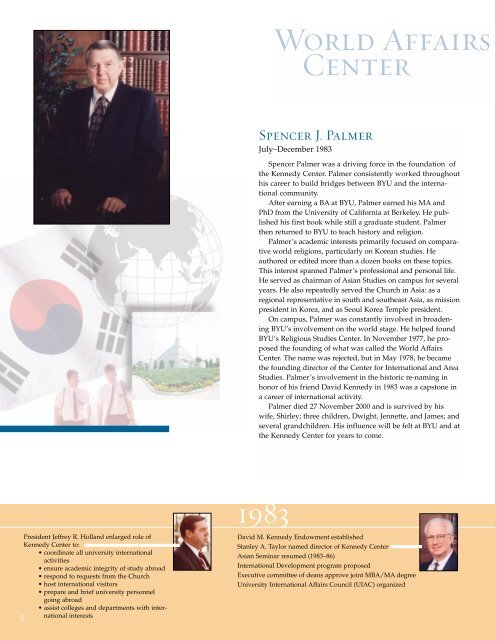BRIDGES - Kennedy Center - Brigham Young University
BRIDGES - Kennedy Center - Brigham Young University
BRIDGES - Kennedy Center - Brigham Young University
Create successful ePaper yourself
Turn your PDF publications into a flip-book with our unique Google optimized e-Paper software.
President Jeffrey R. Holland enlarged role of<br />
<strong>Kennedy</strong> <strong>Center</strong> to:<br />
• coordinate all university international<br />
activities<br />
• ensure academic integrity of study abroad<br />
• respond to requests from the Church<br />
• host international visitors<br />
• prepare and brief university personnel<br />
going abroad<br />
• assist colleges and departments with international<br />
interests<br />
8<br />
World Affairs<br />
<strong>Center</strong><br />
Spencer J. Palmer<br />
July–December 1983<br />
Spencer Palmer was a driving force in the foundation of<br />
the <strong>Kennedy</strong> <strong>Center</strong>. Palmer consistently worked throughout<br />
his career to build bridges between BYU and the international<br />
community.<br />
After earning a BA at BYU, Palmer earned his MA and<br />
PhD from the <strong>University</strong> of California at Berkeley. He published<br />
his first book while still a graduate student. Palmer<br />
then returned to BYU to teach history and religion.<br />
Palmer’s academic interests primarily focused on comparative<br />
world religions, particularly on Korean studies. He<br />
authored or edited more than a dozen books on these topics.<br />
This interest spanned Palmer’s professional and personal life.<br />
He served as chairman of Asian Studies on campus for several<br />
years. He also repeatedly served the Church in Asia: as a<br />
regional representative in south and southeast Asia, as mission<br />
president in Korea, and as Seoul Korea Temple president.<br />
On campus, Palmer was constantly involved in broadening<br />
BYU’s involvement on the world stage. He helped found<br />
BYU’s Religious Studies <strong>Center</strong>. In November 1977, he proposed<br />
the founding of what was called the World Affairs<br />
<strong>Center</strong>. The name was rejected, but in May 1978, he became<br />
the founding director of the <strong>Center</strong> for International and Area<br />
Studies. Palmer’s involvement in the historic re-naming in<br />
honor of his friend David <strong>Kennedy</strong> in 1983 was a capstone in<br />
a career of international activity.<br />
Palmer died 27 November 2000 and is survived by his<br />
wife, Shirley; three children, Dwight, Jennette, and James; and<br />
several grandchildren. His influence will be felt at BYU and at<br />
the <strong>Kennedy</strong> <strong>Center</strong> for years to come.<br />
1983<br />
David M. <strong>Kennedy</strong> Endowment established<br />
Stanley A. Taylor named director of <strong>Kennedy</strong> <strong>Center</strong><br />
Asian Seminar resumed (1983–86)<br />
International Development program proposed<br />
Executive committee of deans approve joint MBA/MA degree<br />
<strong>University</strong> International Affairs Council (UIAC) organized


